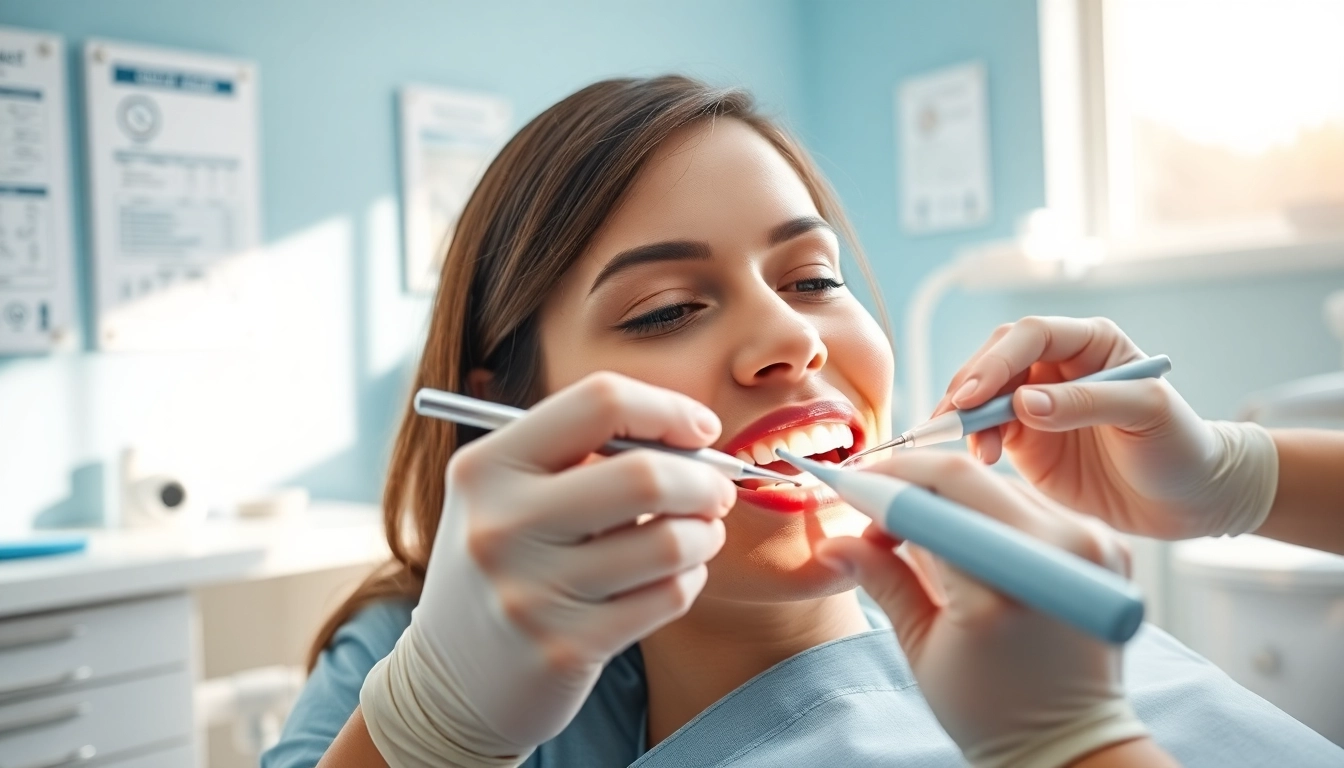Understanding Dental Cleanings: Importance, Process, and Benefits for Your Oral Health
What Are Dental Cleanings?
Definition and Importance of Dental Cleanings
Dental cleanings are professional dental procedures performed by a dentist or a dental hygienist aimed at maintaining optimal oral health. These cleanings help remove plaque, tartar, and bacteria from tooth surfaces to prevent cavities and gum disease. Regular dental cleanings are an essential aspect of preventive dental care, ensuring that individuals maintain healthy teeth and gums throughout their lives.
A typical dental cleaning is recommended every six months but may vary depending on an individual’s dental health needs. Those with pre-existing dental conditions or higher risk for oral diseases may need more frequent cleanings. The process not only targets visible debris but also delves deep into areas that may remain untouched by regular brushing and flossing, helping to ensure long-term dental health. For more information on dental cleanings, including their benefits and importance, this article delves deeper into the various aspects of dental care.
Types of Dental Cleanings
There are several types of dental cleanings, each tailored to specific dental needs. The primary types include:
- Prophylactic Cleaning: This is the standard cleaning procedure aimed at preventing oral diseases in patients with good oral hygiene. It involves removing plaque and tartar buildup from above the gum line.
- Deep Cleaning (Scaling and Root Planing): This cleaning is required for patients with gum disease. It involves cleaning below the gum line to remove buildup that could lead to further complications.
- Periodontal Maintenance Cleaning: For those who have previously undergone treatment for gum disease, this cleaning is more extensive and occurs more frequently to monitor and maintain gum health.
- Child Dental Cleaning: Special considerations are made for children’s dental cleanings, focusing on both hygiene and education to foster good oral health habits.
Who Should Undergo Dental Cleanings?
Dental cleanings are essential for individuals of all ages, from young children to seniors. Particularly, people with:
- Pre-existing dental conditions.
- Risk factors for periodontal disease, such as diabetes or a family history of dental issues.
- Heavy plaque or tartar buildup.
- Poor oral hygiene routines.
- Regular oral infections or cavities.
Pregnant individuals, smokers, and those with chronic medical conditions should consult dental professionals for personalized cleaning frequencies and techniques to improve their oral health.
The Dental Cleaning Process Explained
Initial Examination and Assessment
Prior to a dental cleaning, the dentist will perform a thorough examination, checking for any signs of oral health issues such as cavities, gum disease, or other abnormalities. This examination may include digital X-rays if necessary. The dentist assesses overall dental health and creates a cleaning plan tailored specifically to the patient’s needs.
Steps Involved in a Standard Dental Cleaning
A standard dental cleaning typically follows these steps:
- Physical Exam: The hygienist will review your medical history and existing dental concerns while examining your teeth and gums.
- Removing Plaque and Tartar: Using specialized tools, the hygienist will remove tartar from the crown of the teeth and below the gum line.
- Polishing: A gritty toothpaste-like material is used with a high-powered electric brush to polish teeth and remove surface stains.
- Flossing: Expert flossing is performed to ensure all spaces between teeth are cleaned, reaching areas that the brush may have missed.
- Final Advice: The dentist may provide personalized oral hygiene tips, dietary recommendations, and schedule follow-up appointments if necessary.
Post-Cleaning Care and Recommendations
After the cleaning procedures, it’s essential to follow care recommendations provided by the dentist. Common advice includes:
- Brushing at least twice daily with fluoride toothpaste.
- Flossing daily to remove plaque and food particles.
- Avoiding sugary foods and beverages.
- Using an antibacterial mouthwash to further reduce plaque buildup and bacteria.
Benefits of Regular Dental Cleanings
Preventing Tooth Decay and Gum Disease
Regular dental cleanings play a vital role in preventing tooth decay and gum disease. The removal of plaque and tartar reduces the risk of cavities and periodontal diseases, which can lead to more severe health issues if left untreated. Cleanings help ensure healthier gums and prevent potential tooth loss due to untreated infections.
Improving Overall Health and Wellbeing
Oral health is interconnected with overall health. Recent studies show an association between periodontal disease and systemic conditions such as diabetes, heart disease, and even respiratory illness. By maintaining good oral health through regular cleanings, individuals may reduce their risk of these ailments and promote long-term wellness.
Enhancing Oral Hygiene Practices
Professional dental cleanings enhance awareness of effective oral hygiene practices. Patients can learn proper brushing and flossing techniques, which are crucial in maintaining oral health. Additionally, cleanings can surface any habits that may need adjustment, such as overly aggressive brushing or neglecting areas of the mouth.
Common Concerns and Misconceptions About Dental Cleanings
Does Dental Cleanings Hurt?
One of the most common concerns about dental cleanings is discomfort. While some individuals may experience slight sensitivity during the procedure, most find that a skilled hygienist minimizes any discomfort. Patients are encouraged to communicate their pain levels, allowing professionals to employ strategies that enhance comfort, such as topical anesthetics or adjusting cleaning techniques.
Addressing the Cost of Dental Cleanings
The cost of dental cleanings can vary based on several factors, including geographical location, the complexity of the cleaning, and the specific dental office’s pricing structure. Most dental insurance plans cover at least part of the cost for routine cleanings, which makes them more affordable. Patients are advised to explore their insurance benefits and inquire about payment plans if cost is a concern.
When Are Dental Cleanings Necessary?
Dental cleanings are necessary for everyone, but the frequency may differ. Standard guidance is every six months; however, individuals with specific health conditions or behaviors that impact oral health may require cleanings every three to four months. Utilizing the dentist’s recommendations, individuals can establish a routine that best suits their oral health needs.
Finding the Right Dentist for Your Dental Cleanings
What to Look for in a Dental Professional
Choosing the right dental professional is critical for comprehensive care. Aspects to consider include:
- Qualifications and experience in general dentistry.
- Patient reviews and testimonials regarding office staff and cleaning procedures.
- Office environment and technology used.
- Approachability of the dentist in addressing questions and concerns.
Questions to Ask Before Your Appointment
Prior to your appointment, it is beneficial to ask questions that can aid in establishing a trusting relationship with your dentist. Sample questions include:
- What methods do you use for cleanings, and what can I expect during my visit?
- How do you handle patients who experience anxiety or discomfort during cleanings?
- What is your follow-up care process after dental cleanings?
How to Prepare for Your Dental Cleaning
Preparing for a dental cleaning appointment can make the experience more efficient and productive. Tips include:
- Arrive with a list of any medications and health issues.
- Communicate your oral care routine and any concerns to the hygienist.
- If you have previous dental records, bring them along, or authorize the dentist to obtain them.
- Consider a brief review of oral hygiene practices to discuss during your visit, enhancing engagement with your care process.



